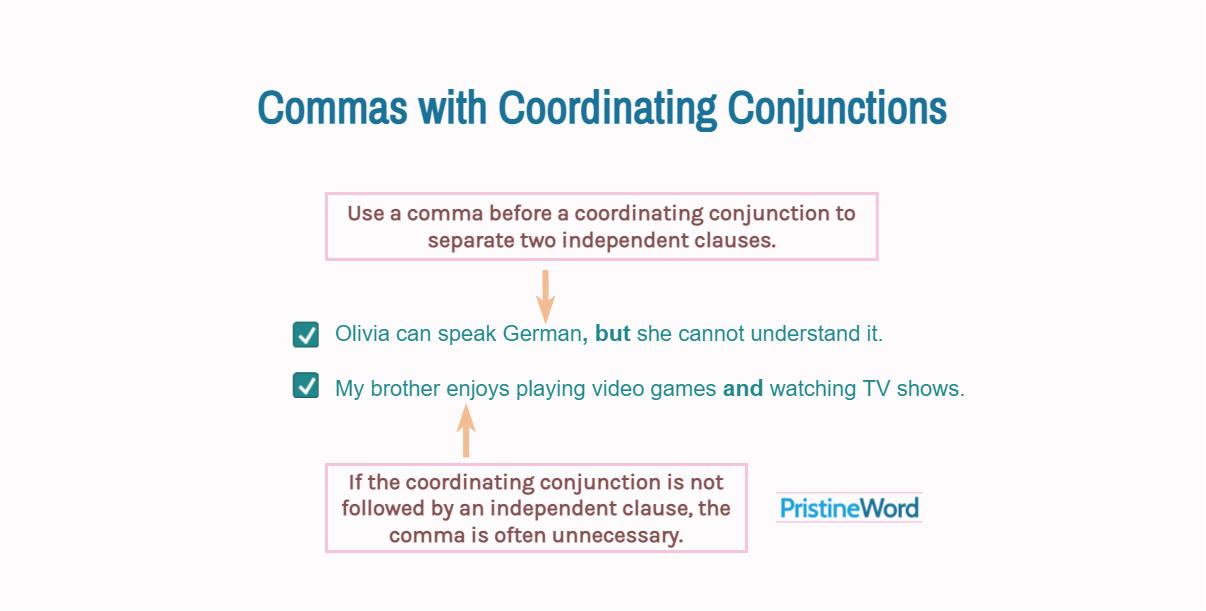Use a comma before a coordinating conjunction to separate two independent clauses. Often a comma is unnecessary when the coordinating conjunction is not followed by an independent clause.
We should put a comma before a coordinating conjunction to separate two independent clauses.
Olivia can speak German, but she cannot understand it.
Olivia can speak German but she cannot understand it.
If the coordinating conjunction is not followed by an independent clause, the comma is often unnecessary.
My brother enjoys playing video games and watching TV shows.
Contents
1. When to Use a Comma Before a Coordinating Conjunction
A coordinating conjunction joins two words, phrases, clauses, or sentences of similar importance, structure, or function.
Did James drive home, or did he go by train?
My favorite colors are red and blue.
You can use the acronym FANBOYS (For, And, Nor, But, Or, Yet, So) to remember the seven coordinating conjunctions.
1.1. General rule
Add a comma before a coordinating conjunction to introduce an independent clause (group of words that can stand alone).
My sister can speak Spanish, and I can speak French.
My sister can speak Spanish and I can speak French.
An independent clause has a subject and a verb; consequently, you can usually omit the comma if the subject does not appear in front of the second verb.
Olivia stopped playing video games and went to the library.
1.2 'And/Or'
We can also place a comma before and (or a comma before or) in a list of three or more items.
My boyfriend is tall, confident, and funny.
The final comma in a series of three or more things, also known as the serial comma or Oxford comma, is optional.
1.3 'But'
Use a comma before "but" to introduce an independent clause.
Claire loves eating, but she wants to control her weight.
Claire loves eating but she wants to control her weight.
Some style guides recommend the comma before "but" even if the subject is expressed only once.(1)
James went to London, but didn't visit the Buckingham Palace.
1.4 'So'
Place a comma before "so" (coordinating conjunction) when meaning "therefore".
Alice overslept yesterday, so she missed the audition.
Keep in mind, however, that "so" can also be a subordinating conjunction (meaning "so that"). We do not use a comma in this case.
Plan your budget so you can avoid spending too much.
1.5 'Nor'
Similarly, place a comma before "nor" to introduce an independent clause.
I prefer not to eat healthy food, nor do I like to work out.
But we do not typically place a comma before "nor" when joining two subjects, two objects, or two verbs.
Sarah neither emailed nor phoned.
1.6 'Yet'
Yet is frequently used as an adverb, but it can also be a conjunction. As mentioned above, use a comma before "yet" when introducing an independent clause.
Robert seems very smart, yet he is just like you and me.
1.7 For
We can use the coordinating conjunction "for", typically in literary language or very formal situations, as a synonym of "because".
I frequently go to a Buddhist temple, for I love to meditate.
When acting as a preposition, we do not usually add a comma before "for".
Many children love to read just for pleasure.
2. More Examples
'And/Or'
- Robert didn't speak to anyone, and nobody spoke to him.
- I had eggs, bacon, and iced tea.
- Choose an elegant interior paint color, such as blue, white, or black.
'But'
- I wasn't happy with John, but I had a great time with Claire.
- She loves David, but he loves someone else.
- I would buy that purse, but I have to save money for college.
'So'
- Sarah didn't know what to say, so she stood quietly and smiled.
- My friend Rebecca has always been interested in medicine, so she became a regarded doctor in Houston.
- Commodity prices are low, so buy now before prices go up.
'Nor'
- I didn't think it would snow in July, nor did the weather forecast predicted it.
- Alexander didn't reply to my emails, nor did he return my calls.
- I don't expect poor work performance here, nor do I allow being disrespectful to management.
'Yet'
- Olivia loves Mark, yet she prefers not to marry him.
- This pizza tastes good, yet it could be improved.
- Harold is really intelligent, yet he is narcissistic and jealous.
'For'
- I believed what Alice said, for surely she would not lie to us.
- David must have been starving, for he ate everything in a few minutes.
- My uncle John is a sage, for he has knowledge, experience, and good judgement.
3. References
(1) Strunk JR., William; White, E.B. The Elements of Style. Chapter 1 - Elementary Rules of Usage.

